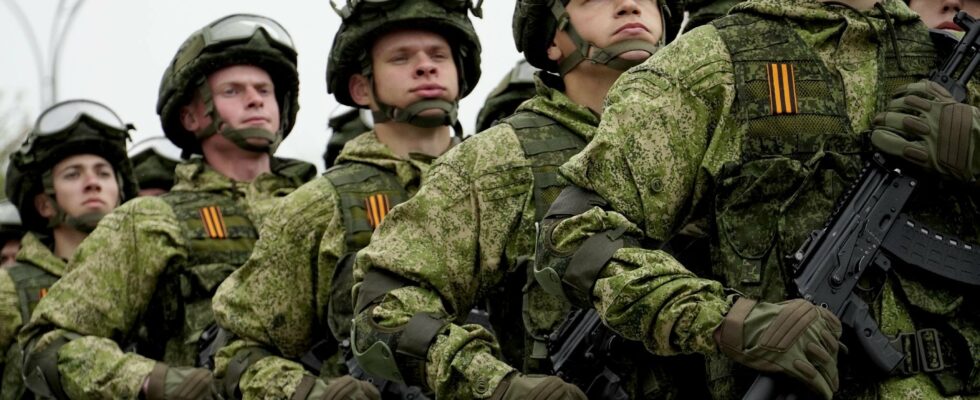Sitting on a terrace in a town in the south of France, Anton* remembers the hell of the front in Ukraine and the trenches of Donbass, over the cigarettes he crushes in his ashtray. Like hundreds of others, this Muscovite deserted the ranks of the Russian army. At the age of 40, he was never a volunteer to enlist, nor mobilized according to the normal rules of conscription. On the contrary, Anton comes straight from prison. “I was a drug dealer, then an informant for the police, in Moscow,” he explains to L’Express, crushing yet another cigarette butt. In 2021, however, I was arrested by another government agency and sentenced to several years in prison.”
Although he signed the military contract at the beginning of September 2023, joining the battalions of the “special military operation” was never part of his plans, assures Anton. “From the start, enormous pressure was put on the prisoners to commit. Threats, sexual assaults… There, it was Guantánamo. We had to sing the Russian anthem several times a day, thank Putin … My fellow detainees were dissidents, “foreign agents”, and Ukrainian prisoners of war.”
Recruitments by the Ministry of Defense
Anton is one of tens of thousands of detainees released from their cells to find themselves in another hell, this time under the open sky, on the front lines of the war in Ukraine. Prison recruitment began at a time when the late Yevgeny Prigozhin, head of the Wagner mercenary company, who died in a plane crash in the summer of 2023, played a leading role in waging the war. It was he who had the idea of offering “zeks” (prisoners sentenced to years of imprisonment or even life imprisonment) a chance to be pardoned in return for their commitment to the front. According to a recent survey from the independent Russian media Mediazona and the British channel BBC, 48,000 prisoners joined Wagner’s ranks, across all of Russia, between January 2022 and August 2023.
From February 2023, the Russian Ministry of Defense took charge of recruiting prisoners. The agreement was simple: the detainees obtained freedom and the right to have their criminal records erased in exchange for six months spent on the front lines against the Ukrainian army. From September 2023, conditions have tightened: fixed-term contracts have been transformed into “CDI”. Understand: until the war ends.
No one knows exactly how many prisoners are currently fighting on the front. His body covered in tattoos, Anton was assigned to the Shtorm V battalion, “which looked more like a ‘gang’ than a real combat unit.” He fought for a month on the front line in Makeevka, Luhansk Oblast, before being placed in the rear. He swears he didn’t kill anyone.
A life expectancy of less than three months
“We can’t imagine what’s going on there,” Anton breathes, haunted by hellish images. “I don’t know a single person who didn’t regret signing an employment contract nor anyone who wanted to stay there. low”, he adds, scrolling through videos on his phone of trenches invaded by rats, a dilapidated military hospital or even a camp with horrible bunk beds. None of his battalion comrades are still active. Of a “promotion” of 105 people, half were killed in combat or died from their wounds, the other half are recovering in hospital. Zeks are generally used as cannon fodder in the most dangerous combat zones. According to a BBC investigation in April, their life expectancy on the front barely exceeded three months.
“I caught pneumonia because of the humidity in the camp, which allowed me to move to the rear and carry out evacuation missions in Luhansk. It’s the place where everyone wants go, because it is from here that it is easiest to desert.” On leave, Anton returned home to the Russian capital, flew to Belarus, then to Armenia, and finally went to France, thanks to a tourist visa in the Schengen area still valid, which expires in a few weeks. One of his comrades in arms did the same.
If the former prisoners manage to survive, it is at the cost of trauma that they will carry throughout their lives. Anton now suffers from recurring migraines and anxiety attacks. In Russia, their return sometimes gives rise to an increase in violence in society because particularly bloodthirsty criminals have been released. In France, where he lives and works odd jobs, Anton requested asylum. But like all deserters, even those who reached Europe, the fear of being caught up in the war persists. “I’m afraid for myself, I’m afraid for my family back in Russia,” he concludes.
*The first name has been changed
.
